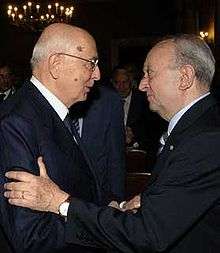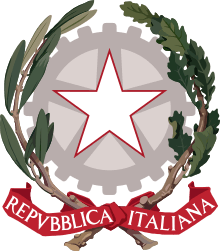Tullio De Mauro
Tullio De Mauro (31 March 1932 – 5 January 2017) was an Italian linguist, a professor emeritus of general linguistics at the Faculty of Humanities of the University of Rome "La Sapienza" and an Italian politician.
Tullio De Mauro | |
|---|---|
 | |
| Italian Minister of Education | |
| In office 25 April 2000 – 11 June 2001 | |
| Prime Minister | Giuliano Amato |
| Preceded by | Luigi Berlinguer |
| Succeeded by | Letizia Moratti |
| Personal details | |
| Born | 31 March 1932 Torre Annunziata, Italy |
| Died | 5 January 2017 (aged 84) Rome, Italy |
| Nationality | Italian |
| Political party | Independent |
| Alma mater | Sapienza University of Rome |

Biography
He was the younger brother of the journalist Mauro De Mauro who was kidnapped and killed in September 1970, while investigating the Sicilian Mafia.
He was born in Torre Annunziata, Province of Naples. In 1963 he published the monumental Storia linguistica dell'Italia unita ("Linguistic History of Unified Italy"). Two years later De Mauro published L'introduzione alla semantica ("Introduction to Semantics") and, in 1971, Senso e significato.[1]
After preparing the entries on semiotics of the Treccani encyclopedia and publishing the short volume Minisemantica (1982), De Mauro turned to the problem of linguistic education.
De Mauro was a professor at the D'Annunzio University of Chieti–Pescara and was director of the Department of Linguistic Science at the University of Rome La Sapienza.
In 1975 he has been elected to the Regional Council of Lazio in the lists of PCI. In 1976 he has been appointed commissioner for culture, position he held until 1978.
He was the Minister of Education during the second Government of Prime Minister Guliano Amato.
From 2001 to 2010 he chaired digital world, the foundation of the city of Rome.
He has collaborated in newspapers and magazines: 1956-1964 with the weekly Il Mondo, from 1966 to 1979 the newspaper Paese Sera, from 1981 to 1990 with regular columns on the school (1981–85) and language (1986 ff.) the weekly L'Espresso. He occasionally collaborated with L'Unità, La Stampa, La Repubblica, Il Manifesto, Il Sole-24 Ore, Il Mattino and regularly with Internazionale with the headings "The word" since 2006 and "Schools" since 2008.
Between 1960 and 1973 he collaborated frequently on radio and television RAI when he went back to work again in 1997-2000. Since 1978 he has worked in cycles of radio and television broadcasts of the RTSI (Swiss Italian Radio and Television).
Conferences
De Mauro delivered lectures and gave seminars at universities in various countries:
- Albania (Tirana, 2005),
- Argentina (1995, Buenos Aires),
- Belgium (1968: UL Brussels 1974: Leuven and Louvain visiting UC),
- Brazil (1995 and Fluminense Federal Rio de Janeiro),
- Canada (1988 Quebec; 1993 Montreal),
- Chile (1995: State, Santiago),
- China (1988: Peking Bedo;, 2005: Faculty of languages),
- France (1969: Aix-en-Provence; 1972: Paris VII),
- West Germany (1987: Heidelberg, Tübingen, 1990: Köln, Hamburg),
- Germany (1994: Freie Universitaet Berlin, Potsdam, 2008 Freie Universitaet Berlin and Humboldt, Stuttgart 2009),
- Japan (1980: Waseda University and University of Tokyo Tokyo, Kyoto, Osaka, 1987, visiting Waseda University Tokyo, 1988, Waseda University Tokyo, Kyoto, 1990: Waseda University, Sophia University, Tokyo, 1995, Waseda University, as a guest of the Japan Foundation;, 2002, 2004, 2006, 2008: Tokyo Waseda),
- Great Britain (1979: Reading, London 2004),
- Greece (2009: Panteion University of Athens),
- Hungary (1985: Budapest, Szeged),
- Netherlands (1975: Amsterdam),
- Norway (1978: Oslo, Bergen),
- Romania (Bucharest, 2009),
- Spain (1969: Madrid, 1985.1989, 2003 Barcelona, 1993, Cordoba, Málaga, 1994: Zaragoza),
- Sweden (1966: Stockholm, Uppsala, Gothenburg, 1978: Uppsala, 1989, Stockholm, 2005 Stockholm),
- Switzerland (1968: Geneva, Zürich, Basel, 1972: Geneva, 1977 Geneva, Bern, 1987, Geneva, 1991: visiting Bern),
- United States (New York University 1992).
He has held individual lessons in Italian universities and in some Italian cultural institutes abroad and the lesson cycles sns of Pisa (1973), the IUSS in Pavia as Visiting (2007), University of Tübingen (2009) and to 'computerized university Neptune (2009).
Honors
- Rome 1 June 2007 - Medal meritorious of science and culture (From the Italian President Giorgio Napolitano)
- Rome 11 June 2001 - 1st Class / Knight Grand Cross (From the Italian President Carlo Azeglio Ciampi)
- Rome 2 May 1996 - 2nd Class / Grand Officer (From the Italian President Oscar Luigi Scalfaro)
He was awarded the international prize by Giambattista Vico Foundation of Naples and Vatolla (2009). June, 23rd 2006, the Accademia Nazionale dei Lincei awarded him for all of his research and study the Prize of the President of the Republic, given to him by the Italian President Giorgio Napolitano in October.
He has received numerous honorary degrees, including:
- 1999 he was nominated honorary doctor philosophiae et litterarum by the Catholic University of Louvain
- 2005 doctor honoris causa ENS (École Normale Supérieure)
- 1 April 2008, the Waseda University in Tokyo nominated doctor honoris causa in humanities
- 27 February 2009 the University of Bucharest named him an honorary doctor
- 10 November 2010 by the University Sorbonne Nouvelle.
Bibliography
- Storia linguistica dell'Italia unita (prima edizione 1963, Laterza)
- Introduzione alla semantica (prima edizione 1965, Laterza)
- Introduzione, traduzione e commento del Corso di linguistica generale di Ferdinand de Saussure (prima edizione 1967, Laterza; dal 1972 l'apparato di De Mauro correda l'edizione originale francese)
- Senso e significato (raccolta di saggi, 1971, Adriatica, Bari)
- Ludwig Wittgenstein: his Place in the Development of Semantics (1966, Dordrecht)
- Parlare italiano (1973)
- Scuola e linguaggio (1977, 1978)
- Guida all'uso delle parole (prima edizione 1980, Editori Riuniti)
- Minisemantica (prima edizione 1982, Laterza)
- Capire le parole (raccolta di saggi, prima edizione 1994, Laterza)
- Direzione del Grande Dizionario Italiano dell'Uso, 6 voll. (1999, Utet)
- Prima lezione sul linguaggio (2002, Laterza)
- La cultura degli italiani a cura di Francesco Erbani (2004, Laterza)
- La fabbrica delle parole (2005, Utet)
- Introduzione, traduzione e commento degli Scritti inediti di linguistica generale di Ferdinand de Saussure (2005, Laterza)
- Parole di giorni lontani (2006, il Mulino)
- Lezioni di linguistica teorica (2008, Laterza)
- Che cosa è una lingua
- In principio c'era la parola? (2009, Il Mulino)
- Parole di giorni un po' meno lontani (2012, il Mulino)
- La lingua batte dove il dente duole (2013, Laterza; scritto con Andrea Camilleri)
